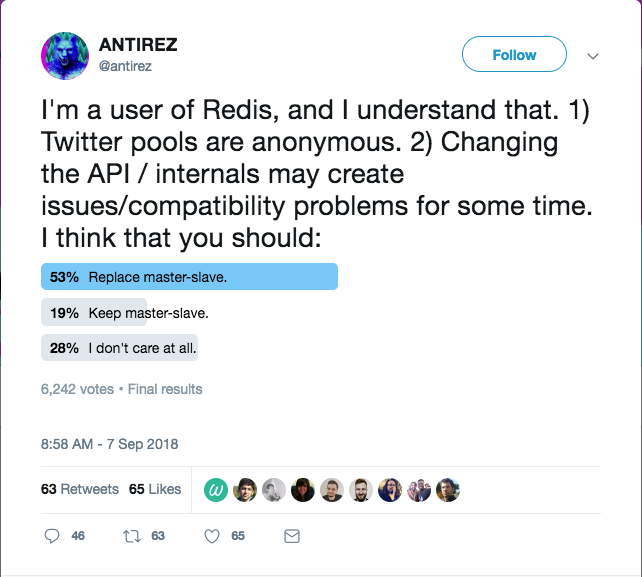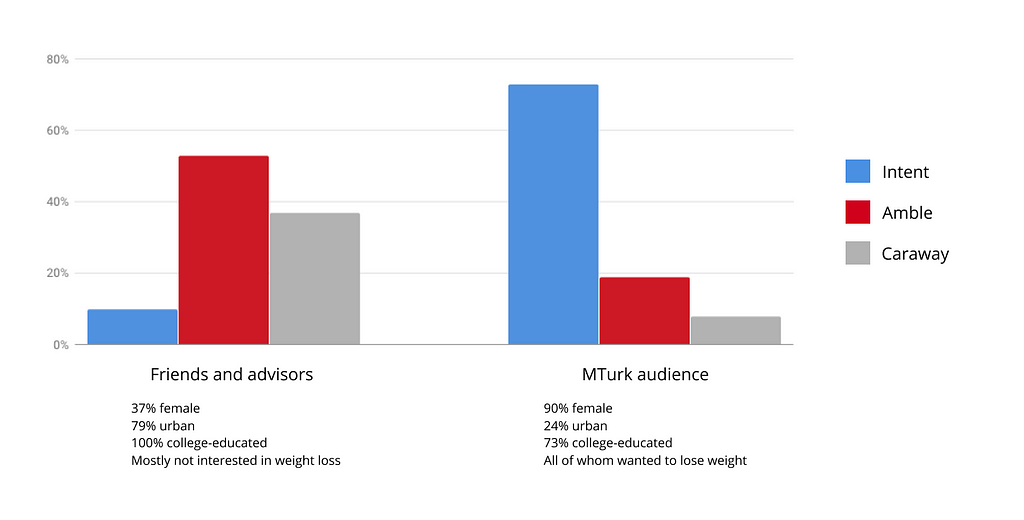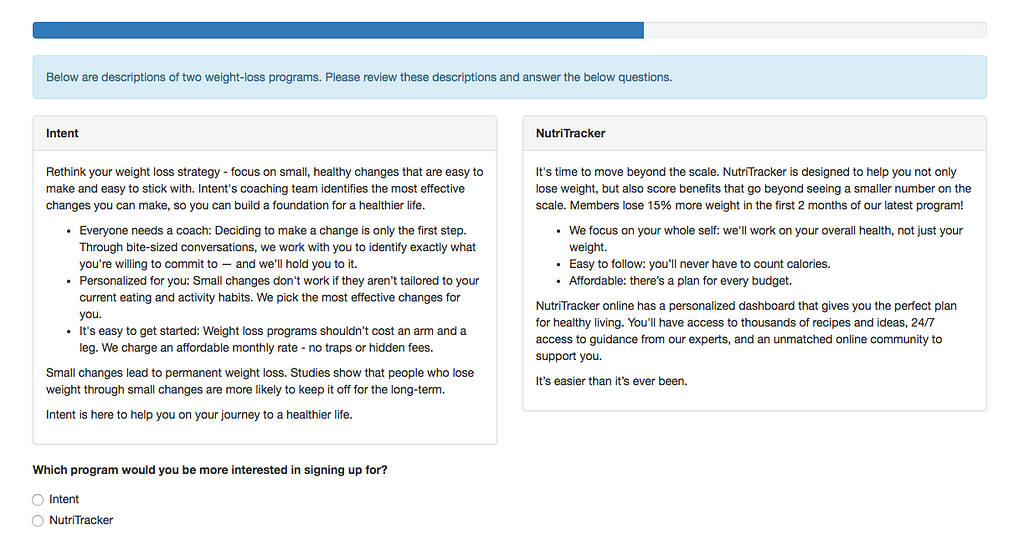Latest news about Bitcoin and all cryptocurrencies. Your daily crypto news habit.

Getting attached to the name of something you’ve been working on is understandable. But that attachment can cloud your judgment.
We’re building a startup that offers weight loss coaching focused on small changes. Since our customers team up with a coach, we initially called our product Tandem. The name worked, we acquired a reasonable domain (jointandem.com), and we were happy with it. But before we launched, we realized that there may be trademark issues (e.g. Tandem Diabetes is a $2B publicly traded company), so we resolved to rename the product.
It sucked. We knew what we wanted from a name — easy to say, easy to spell, an ok domain name — but every idea we came up with seemed weak. We asked our friends and advisors for their thoughts on some of the alternative names we came up with, and the response was underwhelming:
All of these are terrible to be honest
Not a big fan of any of the potential names on this list.
I think the name should be something active, aspirational and/or inspiring
Despite our attachment to Tandem, we had to find a new name that would work.
Surveying preferences is necessary but not sufficient
One way to evaluate a name is to ask other people, but having an attachment to the name can compromise your ability to properly solicit and evaluate feedback. Last September, a startup named Bodega launched with a vision of deploying smart vending machines in convenient locations. The public response to the name, the branding, and the business was swift, and the company quickly backtracked and ultimately renamed itself Stockwell.
Interestingly, the company had actually considered the possibility that Bodega would not have been well-received, and conducted branding research and surveys to ascertain whether this was the case. In one article, their CEO asserted that 97% of respondents were not concerned with the term. Why was there such a disconnect between the survey and the public backlash? A few possible reasons:
- The survey wasn’t properly designed. It seems quite plausible that how you ask about “Bodega” can dramatically skew the results. For example, I’d expect asking people what they think of the company name “Bodega” to produce more positive responses than asking what they think of a company whose vision may result in the decline of bodegas being called “Bodega.”
- The survey wasn’t administered to the right people. They claimed they surveyed a diverse sampling of the community, but it may not have been representative. Perhaps they should have also gotten a sense of what other audiences thought, e.g. the media and influencers who lambasted them.
- A confluence of factors unrelated to the name contributed to the virulent backlash. Just a couple weeks before the launch, the much-maligned startup Juicero had shut down. Public sentiment toward Silicon Valley was already primed to bash startups with grandiose claims, and the impact of automation on jobs was (and continues to be) a concern.
Without knowing what actually happened, the truth probably lies somewhere in between. If you’re pulling for a name, it’s possible you might bias the survey questions to present the name in a favorable light. Maybe you’d shy away from surveying “hostile” audiences, or from digging into the few concerns that were articulated. You would almost certainly devalue the public sentiment risk — after all, your company and your product is going to change the world, why worry about the haters?
If you’re worried you might have a blind spot and you try to mitigate that risk with surveys, be careful. Your surveys might have the same blind spots — bias goes all the way down.
Switching to a performance threshold
One way to prevent the “I’m biased, therefore all validation is likely to be biased” failure mode is to measure something less likely to be swayed, like product adoption. A couple months ago, the creator and maintainer of Redis (@antirez) wrote about his frustrations with complaints about the use of “master/slave” naming with Redis replication. This isn’t a new discussion, neither for Redis, or for other projects, like Drupal, CouchDB, Django, which have already moved away from this nomenclature.
Despite his initial defense of “master/slave”, antirez continued to engage with people on the topic, publicly and privately, and later decided to make the change to “master/replica”. He didn’t change his personal position on the name (i.e. that it wasn’t problematic); rather, he was convinced by the perceived impact. He observed sufficiently many well-meaning people express concern about the naming that it would have negatively impacted usage of Redis.
Changing your opinion on something so publicly is uncommon, but what struck me was how he justified it. He collected qualitative and quantitative feedback from the community, and though he observed strong preferences expressed on both sides, what ultimately swayed him was the impact to adoption. His decision calculus was straightforward: renaming takes some effort and is only justified if it improves adoption by some minimum amount. In this case, he estimated 10% of Redis users were uncomfortable with the current naming, and the remaining 90% would not be impacted by the renaming. Product adoption was an independent, measurable dimension that antirez wasn’t willing to compromise on, so even if his own attachment to the “master/slave” name persisted, it wasn’t relevant.
Renaming Tandem, with Intent
Among our grab bag of underwhelming names, our friends most liked the name “Amble”: over 53% of 19 responses picked Amble as a name they liked. We thought the name was ok, but were concerned the “slowness” connotation was harmful, so we turned to our target audience.
We used Mechanical Turk to recruit 101 survey respondents: Americans aged 18–50 who were overweight and expressed interest in losing weight. When asked the same preference question, just 19% preferred Amble. Intent, one of the remaining names in our shortlist, was picked 73% of the time. We were impressed by the divergent data we collected, between our friends and advisors and our target audience.
Though the reaction to Amble may have surprised us, the reasons provided didn’t.
for some reason i think of someone waddling… which isn’t nice for overweight people
Amble reminds me of stumbling. If I am trying a diet, I don’t want to stumble.
Sound like a old sick person disease.
I’ve been obese and this name would make me feel lazy.
Amble sounds aimless, and like you are just kind of wandering along. It doesn’t sound focused on the goal.
In some sense, this was both our differentiated viewpoint and our blind spot: we believed that small, sustainable changes would beat large, unsustainable ones, and a discouraged dieter would understand that slow and steady wins the race. We didn’t immediately veto Amble because we believed it nicely referenced one aspect of the program (a slower approach), but failed to foresee the level of dissatisfaction that would arise amongst people who interested in weight loss help.
Preference data was helpful, but what sealed the deal was how the name influenced adoption. We ran a second survey with a different sample of the same audience, presenting a full description of our product against a weight loss program modeled off a popular incumbent.
With n = 89, we observed that respondents picked Amble 35% of the time over control, while they picked Intent 54% of the time. We were largely indifferent between Amble and Intent before these surveys, but the data seemed to suggest that Intent was both better from a preference and a performance standpoint, so the decision was a no-brainer.
In retrospect, this was a fairly easy call for us, and not exactly analogous to the public learning and decision-making that Bodega and antirez went through. That being said, our survey results did helpfully expose a blind spot of ours — assuming that people who like small changes would be reasonably patient with results (and therefore wouldn’t mind taking a nice “amble”) — and we’ve since made product changes in line with these updated beliefs.
Despite the initial annoyance of finding a new name, in my experience, every single time I’ve renamed a product, the name ends up working out. Unless the name is particularly atrocious, it grows on you. After all, the value and meaning we ascribe to names tends to mostly be something else, and that “something else” inevitably accumulates over time.
Thanks for reading! You can find more articles like this on our Intent Blog.
How can a name undermine your product? was originally published in Hacker Noon on Medium, where people are continuing the conversation by highlighting and responding to this story.
Disclaimer
The views and opinions expressed in this article are solely those of the authors and do not reflect the views of Bitcoin Insider. Every investment and trading move involves risk - this is especially true for cryptocurrencies given their volatility. We strongly advise our readers to conduct their own research when making a decision.



